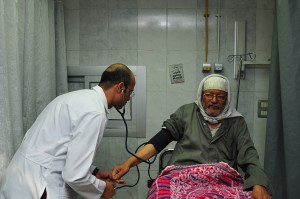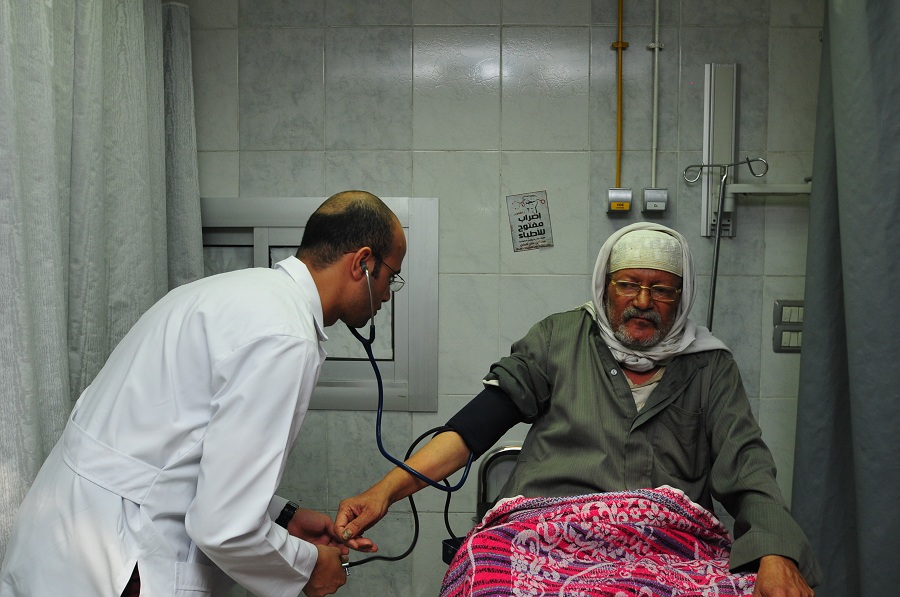
Hassan Ibrahim / DNE
An open-ended doctors strike began on Monday morning. The doctors are demanding a minimum salary of EGP 3,000, an increase of the government health budget to 15 per cent, and better security for hospitals.
Many hospitals have been violently attacked in recent months forcing them to shut their emergency departments in some cases.
According to the strikers, the current health budget does not exceed five per cent. Ultimately, the doctors want patients to receive adequate health services.
Striker Mostafa Al-Beheiry said, “doctors from all the governorates have entered the strike with 50 per cent of the governorates striking 100 per cent and the other 50 per cent striking at a percentage that varies from 50 to 90 per cent.”
Yasser Aly, official spokesperson of the presidency told state-run news agency, MENA that the “doctors’ strike is a guaranteed right.” He also said the presidency doesn’t stand idle in these cases, but attempt to find solutions based on available resources. He pointed out the country is going through a financial crisis caused by the mismanagement of resources by previous administrations.
Aly added that a few days ago President Mohamed Morsy met with representatives of the syndicate and said that EGP 700 million will be used to better their conditions. Responding to this, Al-Beheiry claimed the 700 million was money that should have been paid to the doctors as bonuses, money they would have been entitled to anyway.
The Doctors’ Syndicate reported doctors from tens of public hospitals across the nation are striking, with around 20 hospitals participating in the governorates of Cairo and Giza. It includes hospitals that belong to the Ministry of Health, but not university, armed forces or police hospitals.
Ahmed Hussein, one of the doctors elected to the committee tasked with the negotiation and the administration of the strike said, “thus far the strike is very positive.”
“The most important accomplishment is the response of the street and Egyptian society for their understanding and awareness of the strike, its demands and goals,” Hussein added. Hussein believes this understanding comes from the “doctors’ commitment to treat the patients well and because they continue to offer patients services in the departments that are not included in the strike.
This has lead to harmony between the two parties of the health institution, the two beneficiaries, the medical team and the patients.”
The departments not included in the strike are the receptions, emergency departments, intensive care units, incubators, kidney dialysis, and the oncology departments. “The critical cases are being treated and even cases that are suspected to be in critical condition are taken in and all the required tests are conducted for them,” Al-Beheiry said.
“None of the officials have responded to us so far,” he said, “but we are continuing to strike,” Al-Beheiry said. Hussein also said there “hasn’t been the slightest response from officials.” “The policies of the past continue the officials don’t care about the health of the patients and the conditions of the medical team. However, we are hoping for solidarity from people and we hope they are aware of our demands,” Hussein said.
However, the assistant to the minister of health and population, Abdel Hamid Omar Abaza, said a law for wages is being prepared that will provide for everyone in the medical field, not just doctors. He added that a police headquarters just to secure hospitals will be set up.
He said this has been implemented in five governorates so far and will soon be implemented in the rest. He added they are working to resolve the doctors’ demands but the doctors want immediate change.
If their demands are not met, Hussein and Al-Beheiry will resume hunger strikes, which they had begun and later suspended, on 15 October. They plan to conduct these hunger strikes in front of the presidential palace.
Al-Beheiry said there are other methods of escalation which could be resorted to, such as mass resignations of 20,000 to 30,000 doctors at once.
Thus far, Hussein said, no complaints had come from patients in response to the strike. He said however that there were reports of “thugs who were placed to cause disturbances at one hospital but, the police have implemented legal procedures against them.”
The decision to strike was announced last month after the Doctors’ Syndicate held an exceptional general assembly. The assembly, headed by the chairman of the general syndicate, Khairy Abdel-Dayem, was interrupted when Abdel-Dayem and board members walked out in objection to the doctors’ demands to elect the committee tasked with the administration and negotiations of the strikes. The board wanted to be automatically included in this body, due to their position.
The majority of the doctors felt the board would not represent them well and insisted the committee was elected.
After the chairman of the syndicate walked out, the general assembly was resumed headed by the eldest member present and the committee members were elected by over 1,000 doctors. However, another alternative committee was also formed by the board members of the syndicate.
The media office of the Doctors’ Syndicate said on Monday in a statement, “that the board of the general syndicate is the legitimate body which governs the strike.”
Ahmed Fathy, one of the doctors on the elected committee representing the Governorate of Cairo said that the situation has remained a stalemate, with the board members refusing to recognise the elected committee and the decisions made after they left the general assembly. “They don’t recognise the legitimacy of the general assembly which has more authority than them,” Fathy said.
“The [elected] committee doesn’t want to enter into conflict. Its legitimacy is proven by the general assembly and most of the doctors recognise the elected committee,” Fathy said.
Last week, the committee urged patients who receive medication from the Ministry of Health at the expense of state to pick up their prescriptions ahead the start of the strike on 1 October. The committee sent out faxes to hospitals telling them to hang up posters to inform and reassure the patients. Throughout the strike, Thursday will be the designated day in which patients should pick up their prescriptions.

